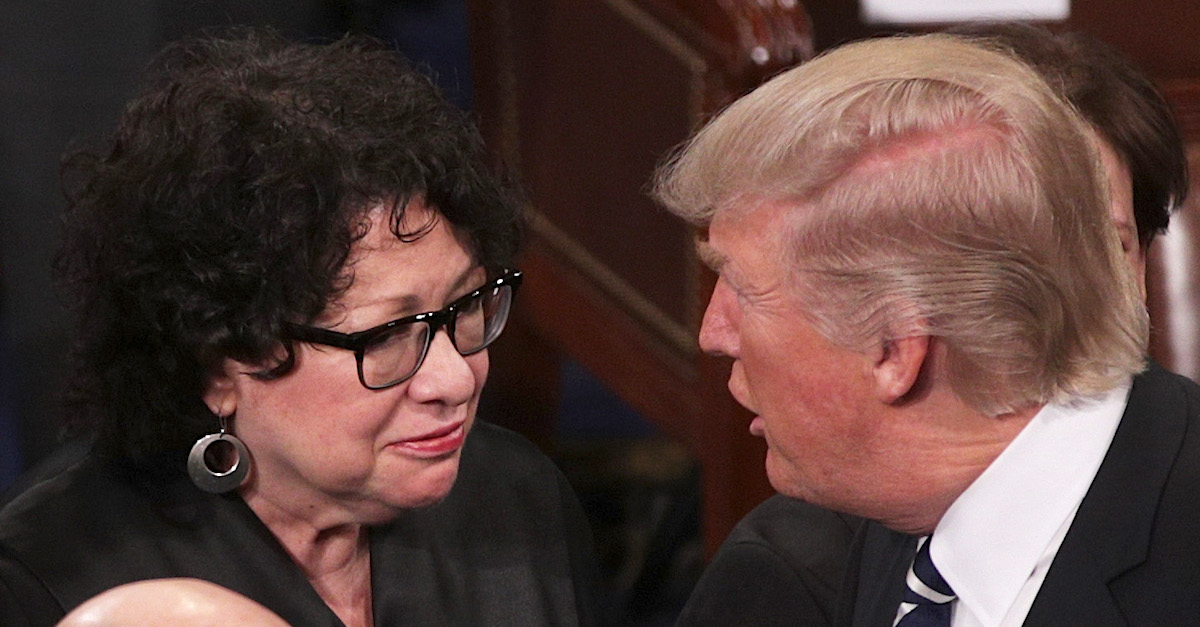
In an order issued Monday morning, the U.S. Supreme Court declined to expedite litigation over President Donald Trump‘s tax returns and other financial records. The decision to keep the case on a normal pace is a potentially devastating blow for Democratic Party investigators who hoped to fast-track those outstanding lawsuits after a piecemeal victory before the nation’s high court earlier this month.
“The applications for orders to issue the judgments forthwith, presented to The Chief Justice and by him referred to the Court, are denied,” the Roberts court wrote in a brief and unsigned order. “Justice [Sonia] Sotomayor would grant the applications.”
This denial all but forecloses against the possibility that Democratic congressional committees–who have long sought Trump’s financial documents–will receive them before the November general election.
Demand Justice, a left-of-center judicial advocacy group that led the charge against the confirmation of Justice Brett Kavanaugh with a blistering ad campaign in 2018, was quick to note that Monday’s order is something of a victory for the White House in this regard.
“Yet again, the Supreme Court is rewarding Trump’s stonewalling and helping him continue hiding his tax returns until after November,” the group’s official Twitter account posted after the news broke.
In practical terms, the three House committees–Financial Services, Oversight and Intelligence–that have issued subpoenas to Trump’s accounting firm Mazars USA, LLP and his prior lender Deutsche Bank could have an exceedingly difficult time moving forward.
Proceeding with the litigation absent a “forthwith” order means those House committees will have to wait nearly three more weeks for the Supreme Court’s opinion to formally vest with the district courts in both New York and Washington, D.C. that originally heard the cases. The 45th president, along with his children and businesses, originally sued to contest the Deutsche Bank subpoena in the District Court for the District of Columbia while suing to stop the Mazars subpoena in the District Court for the Southern District of New York.
Per the Supreme Court’s Rule 45 on Process, in relevant part:
[T]he mandate issues 25 days after entry of the judgment, unless the Court or a Justice shortens or extends the time, or unless the parties stipulate that it issue sooner.
Supreme Court reporter Steven Mazie notes that the district courts will likely take up the issues on August 5 — at the earliest.
Giving up nearly a month’s worth of time, however, could mean more than a welcome delay for Trump–it could mean the subpoenas will become moot altogether. The present Congress expires on Jan. 3, 2021 and the litigation must be settled before then or the committees’ underlying claims will, like a fall squash at the witching hour, be sapped of legal authority at the end of the current session.
“Given how weak Trump’s arguments were in opposing the House’s request, this denial is a bit of a surprise,” mused University of Texas Law Professor Steve Vladeck.
Late last week, the Supreme Court granted expeditious relief in the companion Trump tax return case featuring Manhattan District Attorney Cyrus Vance. In that situation, however, both parties consented to the forthwith resolution of the subpoena.
[image via Alex Wong/Getty Images]